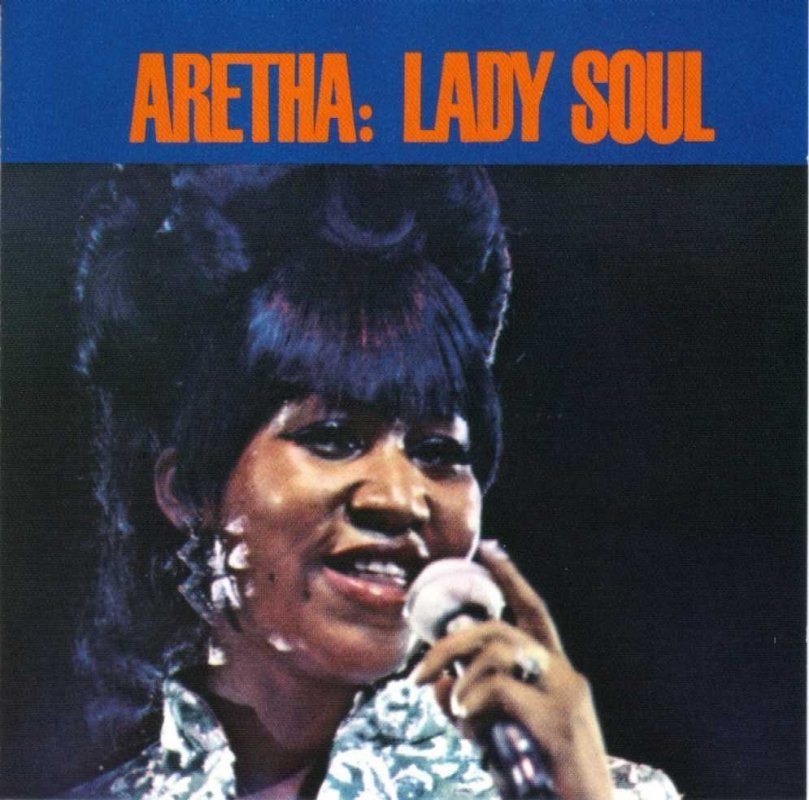Now Playing
Current DJ: Sarah A.
The French Goodbye Manitoba from Sueños Son Sueños (Roydale) Add to Collection
Requests? 773-DJ-SONGS or .(JavaScript must be enabled to view this email address)
 Today's Rediscovering Our Record Collections entry takes another listen to Queen of Soul Aretha Franklin's 1968 masterpiece, Lady Soul. This album was Franklin's third for Atlantic Records and one of her most commercially and critically acclaimed releases, containing several hits. Franklin is the daughter of the famous preacher C. L. Franklin, and the gospel music she grew up hearing had a huge influence on her impassioned vocals. She first recorded gospel as a teenager before signing with Columbia Records and recording pop and jazz standards in the early and mid-1960s.
Today's Rediscovering Our Record Collections entry takes another listen to Queen of Soul Aretha Franklin's 1968 masterpiece, Lady Soul. This album was Franklin's third for Atlantic Records and one of her most commercially and critically acclaimed releases, containing several hits. Franklin is the daughter of the famous preacher C. L. Franklin, and the gospel music she grew up hearing had a huge influence on her impassioned vocals. She first recorded gospel as a teenager before signing with Columbia Records and recording pop and jazz standards in the early and mid-1960s.
Aretha did not gain significant mainstream attention on the radio or press until 1967. This occurred after Atlantic Records producer Jerry Wexler encouraged Aretha to channel her gospel roots while recording the classic rendition of Otis Redding's "Respect" and other covers and origina compositions on her Atlantic debut, I Never Loved a Man the Way I Love You. This '67 masterpiece is generally considered her greatest album, superior even to Lady Soul, but as critic Peter Shapiro wrote several years ago, while both albums contain classic singles, the album tracks on Lady Soul are arguably even better than those on I Never Loved a Man..., making Lady Soul arguably the superior work.
When I first heard this album as a kid, I wasn't crazy about it. I listened to it passively, and noted the fun bounce in tracks like "Niki Hoeky" and the overwhelming passion in hits like "Chain of Fools," but most of the album tracks were lost on me. It wasn't until years later, probably when I heard such tracks on the box set Queen of Soul: The Atlantic Recordings, that the emotion in and the quality of "Good To Me As I Am To You" (with Eric Clapton guesting on guitar) and her cover of Curtis Mayfield's "People Get Ready" really come through. This realization made me give the album a second listen.
I love at least three of the album's four hit singles--"Chain of Fools," "You Make Me Feel Like) A Natural Woman," and "Ain't No Way," with "Since You've Been Gone (Sweet Sweet Baby)" playing a lesser role in the album's greatness. Some of the best, most memorable moments on the album are on these singles: I think of the part in the middle of "Chain of Fools" when the instruments drop out and Aretha takes over with her backup singers. Then there's the second refrain and chorus of "A Natural Woman," that swell and then release of strings and horns (perhaps like an orgasm, which goes along with critic Dave Marsh's assertion about the record's sexual overtones). And finally, the bridge in "Ain't No Way"--climaxing with Franklin shouting, "I, need, you!"--gives me chills every time I hear it.
But the album tracks are pretty damn strong, too. Probably my favorite is an original composition, "Good To Me As I Am To You," but Aretha's versions of "People Get Ready" and Ray Charles' "Come Back Baby" (transformed from a slow blues into a high-energy dance number) are also excellent. The vocals throughout are frankly astonishing, though they are one aspect of the album that perhaps needs reevaluating: as I noted in an article I wrote at PopMatters.com, critics and historians sometimes make the racist claim that '60s (predominantly White) Rock is intellectual and (predominantly Black) Soul is emotional, valuing rock over soul.
Franklin's work is constructed as a prime example of this tendency: in one example, Time magazine writes of Franklin and this album, "The singing here isn't technically perfect--the roots of what would become Franklin's wavering campaign of melody obliteration are evident--unless we're speaking emotionally, in which case there's not a wrong note." So perhaps the uneven praise that this album receives deserves rethinking: one idea I pose in that article is that Rock should be called intellectual, but so should Soul, while acknowledging differences between the genres.
Next entry: What CHIRP Means to Me: Mike Bennett
Previous entry: What CHIRP Means to Me: Erin Van Ness